In professional bodybuilding, few names command respect and carry as much weight as Ronnie Coleman. Considered by many to be the greatest bodybuilder ever, Ronnie Coleman’s record-setting 8 consecutive Mr. Olympia titles cemented his status as a legend in the sport.
Beyond the impressive competitive accolades, Ronnie Coleman inspired legions of fans and aspiring bodybuilders with his superhuman strength, sculpted physique, tireless work ethic, and charismatic personality.
More than a decade after his retirement, he remains the standard that all champions are measured against. Let’s look closer at the life and journey of the man they call “The King” – Ronnie Coleman.
Early Life and Discovery of Bodybuilding
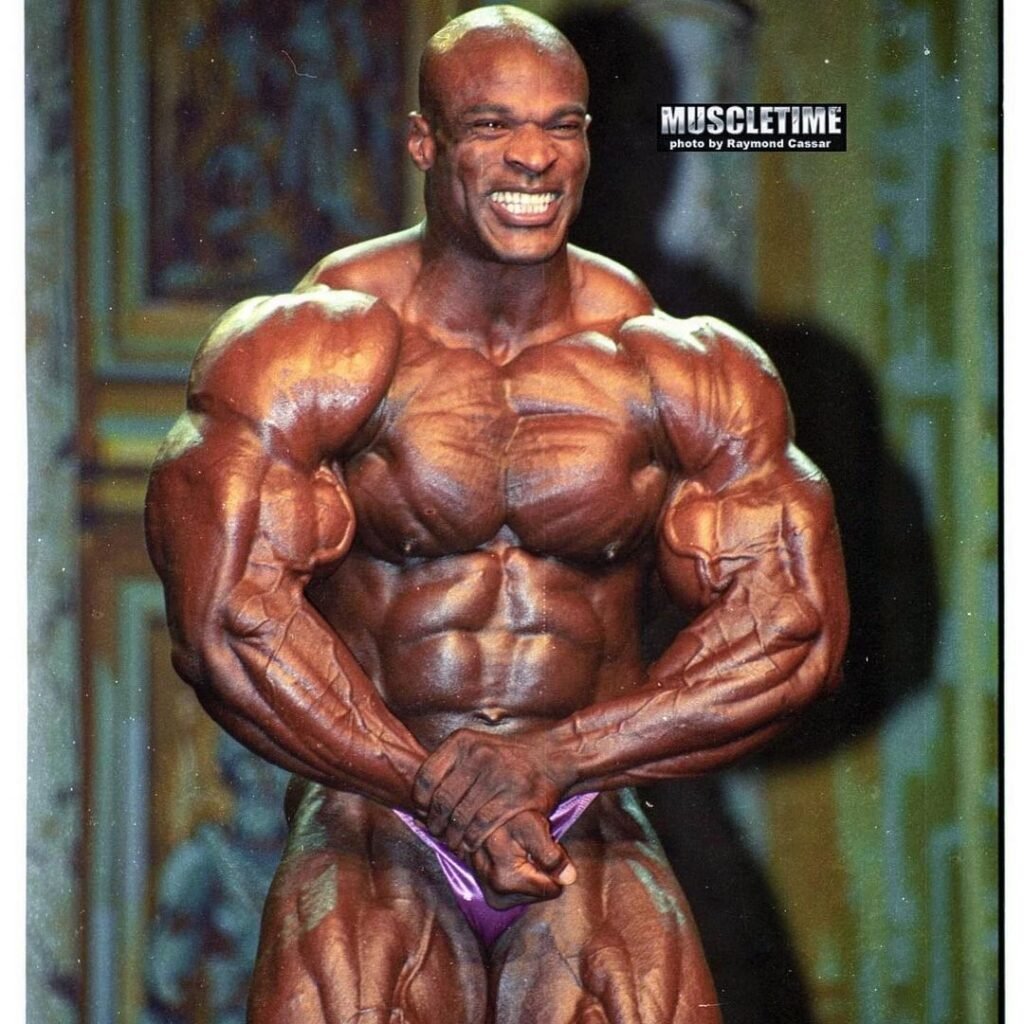
Ronald Dean Coleman was born in Monroe, Louisiana, on May 13, 1964. He grew up in a working-class family and was raised in Bastrop, Louisiana.
From a young age, Ronnie Coleman displayed great athletic talents. He excelled in football during high school, earning all-state honors as a linebacker. After graduation, Coleman attended Grambling State University on a football scholarship.
However, during his senior year, a severe knee injury ended his dreams of playing professional football. At that point, Ronnie Coleman focused on graduating with a degree in accounting.
After college, Ronnie Coleman worked as an accountant for a brief period. But in 1989, he became a police officer with the Arlington Police Department in Texas.
It was during his time with the police force that Ronnie Coleman discovered his passion for bodybuilding. Fellow officers at the station trained and competed in bodybuilding shows. They inspired Ronnie Coleman to begin lifting weights himself.
He started training at Metroflex Gym and immediately took to the iron game, showing rapid muscle and strength development.
Within a few years of serious training, Ronnie Coleman earned his IFBB pro card by winning the heavyweight class and overall title at the 1992 NPC Texas Championships. It started one of the most dominant careers in bodybuilding history.
Early Competitive Success
In his first year as an IFBB professional, Ronnie Coleman took a respectable 6th place at the 1993 Mr. Olympia contest. The following year, he moved up to 5th place in the toughest bodybuilding competition in the world.
Ronnie Coleman’s steady improvements on the Olympia stage each year displayed the future greatness ahead. 1995 he captured his first pro victory by winning the Canada Pro Cup. The following year, Ronnie Coleman seriously announced himself as a new force in the sport.
After winning the 1996 San Jose Pro Invitational, Ronnie Coleman shocked the world by defeating 4-time Mr. Olympia Dorian Yates and capturing the coveted Sandow trophy at the 1996 Arnold Classic.
This monumental victory over the reigning Mr. Olympia cemented Ronnie Coleman’s status as Dorian Yates’ heir apparent.
He carried his momentum into a career-best 3rd place finish at the 1996 Mr. Olympia, foreshadowing more incredible things.
Mr. Olympia Domination
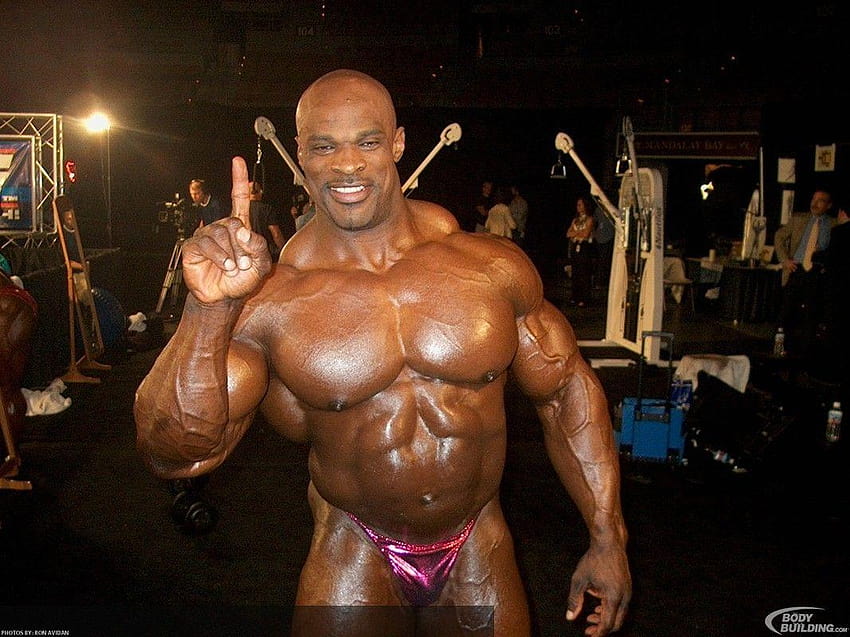
1998 proved to be Ronnie Coleman’s crowning year. After placing 2nd to Dorian Yates in the previous two Olympias, Ronnie Coleman finally assumed the throne after Dorian Yates retired from competition.
He was awarded the most significant title in bodybuilding on his 34th birthday in 1998. This would be the first of many birthday presents, as Coleman’s Mr. Olympia reign lasted a record-setting 8 straight years until 2005.
During his streak, Ronnie Coleman displayed mass and conditioning never before witnessed in the sport. He consistently bettered his performances, taking his physique to unfathomable heights each year he defended the title.
Ronnie Coleman showcased an unparalleled back, perhaps the thickest lats and most massive traps seen on a bodybuilder.
His outrageous upper body development coincided with equally massive quads and hams etched in granite from all angles.
There was no apparent weakness for opponents to attack. Ronnie Coleman’s Mr. Olympia physique established new standards – it was seemingly perfection personified in human form. His dominance was undisputed and remained unthreatened for over half a decade.
Training Philosophy and Insane Strength
How did Ronnie Coleman become a muscle-building machine and the greatest bodybuilder ever? Simple – he trained heavier and more complex than everyone else.
Ronnie Coleman followed a high-volume, powerlifting-inspired training style focused on lifting maximal poundages.
He aimed to increase strength and break PRs in the gym, trusting that sheer muscle size would follow.
Ronnie Coleman’s workouts were the stuff of legend. He used techniques like forced reps, negatives, blood and guts sets, and enormous weights that most would never dream of touching.
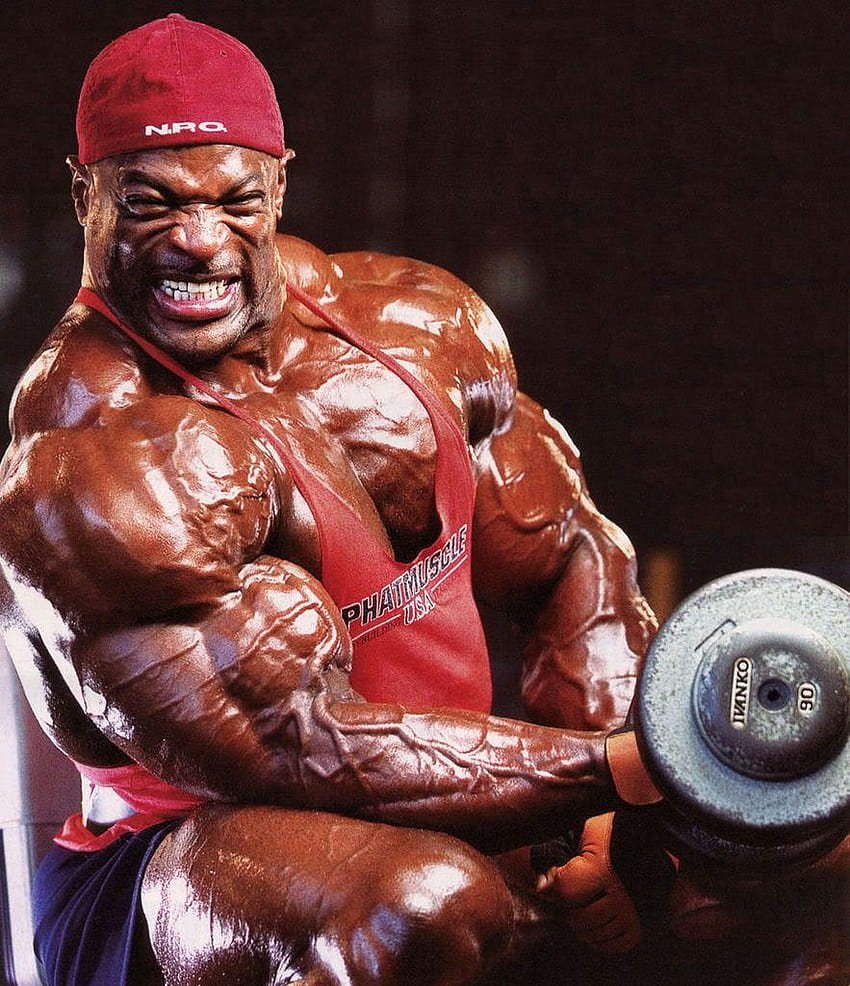
Ronnie Coleman was renowned for his supernatural strength. He could squat 800 pounds, bench press 500, and perform standing military presses with 400-pound dumbbells for reps.
This functional power allowed him to push his muscles to new growth thresholds. Alongside regular training, Ronnie Coleman incorporated special techniques to fatigue his muscles with intense concentration fully.
These included drop sets, partial reps, 21s, and giant sets performed after his usual workout. He pushed his muscle fibers to total failure.
Diet and Supplement Stack
Fueling the mass needed to compete at 300 pounds was no easy feat. Ronnie Coleman consumed 5,000 to 6,000 clean calories daily from chicken, steak, fish, rice, eggs, potatoes, vegetables, protein shakes, and supplements.
His leading supplements included whey protein, a multivitamin, creatine, fat burners, amino, and pre-workout formula.
Ronnie Coleman took pride in developing his physique without steroids, although his massive size led to speculation.
Ronnie Coleman followed a balanced approach eating 6-8 smaller meals throughout the day.
He believed nutrition support was critical and hired trainer Chad Nicholls in 1996 to oversee his diet and preparation. Their partnership led Ronnie Coleman to 8 consecutive Olympia victories.
Training Through Injuries and Pain
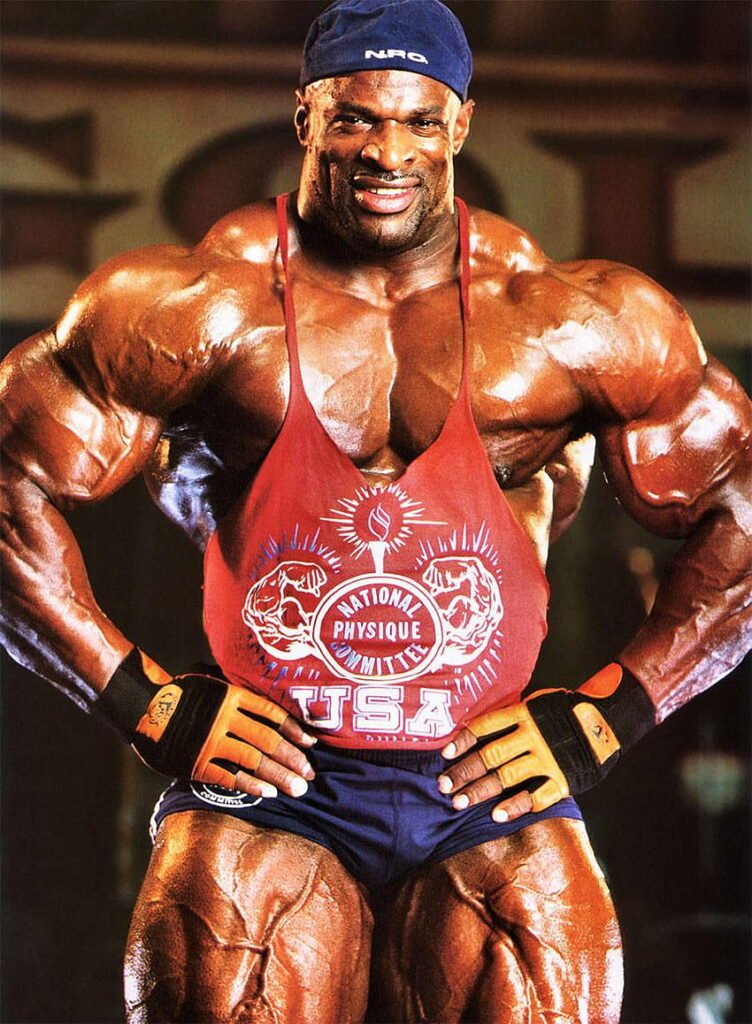
Ronnie Coleman’s extreme training regimen of hoisting maximal weights ultimately took a toll on his body. Throughout his career, he suffered numerous torn muscles, ligaments, injuries, and wear and tear.
Like a warrior, Ronnie Coleman trained through painful injuries that would have stopped most people. He underwent multiple surgeries, including torn biceps operations, triceps reattachments, and significant lower back procedures to fix damaged discs.
Ronnie Coleman credits his mental fortitude as key to persevering through devastating injuries that could easily have ended his career prematurely.
While doctors advised him to stop training during recoveries, Ronnie Coleman pushed through excruciating pain to keep his Olympia title.
His stubbornness to not give up ultimately prolonged his reign at the expense of long-term health consequences. Still, overcoming adversity forged Ronnie Coleman’s ironclad mindset and cemented his warrior mentality.
Retirement and Legacy
After dominating professional bodybuilding for over a decade, the mounting injuries finally caught up with Ronnie Coleman. Placing 4th in the 2006 Mr Olympia, he retired from competition.
Ronnie Coleman walked away firmly established as the greatest champion in history with 8 consecutive Mr. Olympia titles, 26 total pro show wins, and over $10 million in prize money. To this day, his records remain untouched by future challengers.
In retirement, Ronnie Coleman has remained an active sports ambassador through endorsements, seminars, guest appearances, social media, and his Ronnie Coleman Signature Series supplement line.
He inspires millions worldwide, demonstrating that ordinary people can achieve extraordinary things through relentless work ethic and perseverance. Even well into his 50s, Ronnie Coleman’s iconic physique and smile continue lighting up stages.
The King’s Struggles and Perseverance

For Ronnie Coleman, the latter years of his retirement have been filled with excruciating pain and physical hardship.
The extreme weights and training took their toll, as Ronnie Coleman has undergone multiple central back and hip surgeries. Doctors have informed Ronnie Coleman that his body is essentially broken from the years of heavy lifting.
He now walks with great difficulty and relies on wheelchairs for mobility. Still, Ronnie Coleman remains positive and keeps fighting through crippling pain daily.
In 2017, a documentary titled “The King” chronicled Coleman’s health struggles, surgeries, and rehabilitation journey. It depicts his warrior mindset persevering despite being told he may never walk properly again.
Ronnie Coleman believes he will overcome these challenges through the same iron willpower and determination that forged his champion mentality. He continues rehabbing rigorously and pushing his limitations.
Ronnie Coleman’s unmatched success came with a physical cost after decades of record-setting performances.
However, Ronnie Coleman accepts personal responsibility for ignoring advice when training injured and attempting to delay the inevitable.
He has no regrets about chasing greatness and pays the price to this day for his unrelenting quest to be the best. That mindset still inspires new generations of athletes to pursue excellence at all costs.
Ronnie Coleman’s Competition History and Records
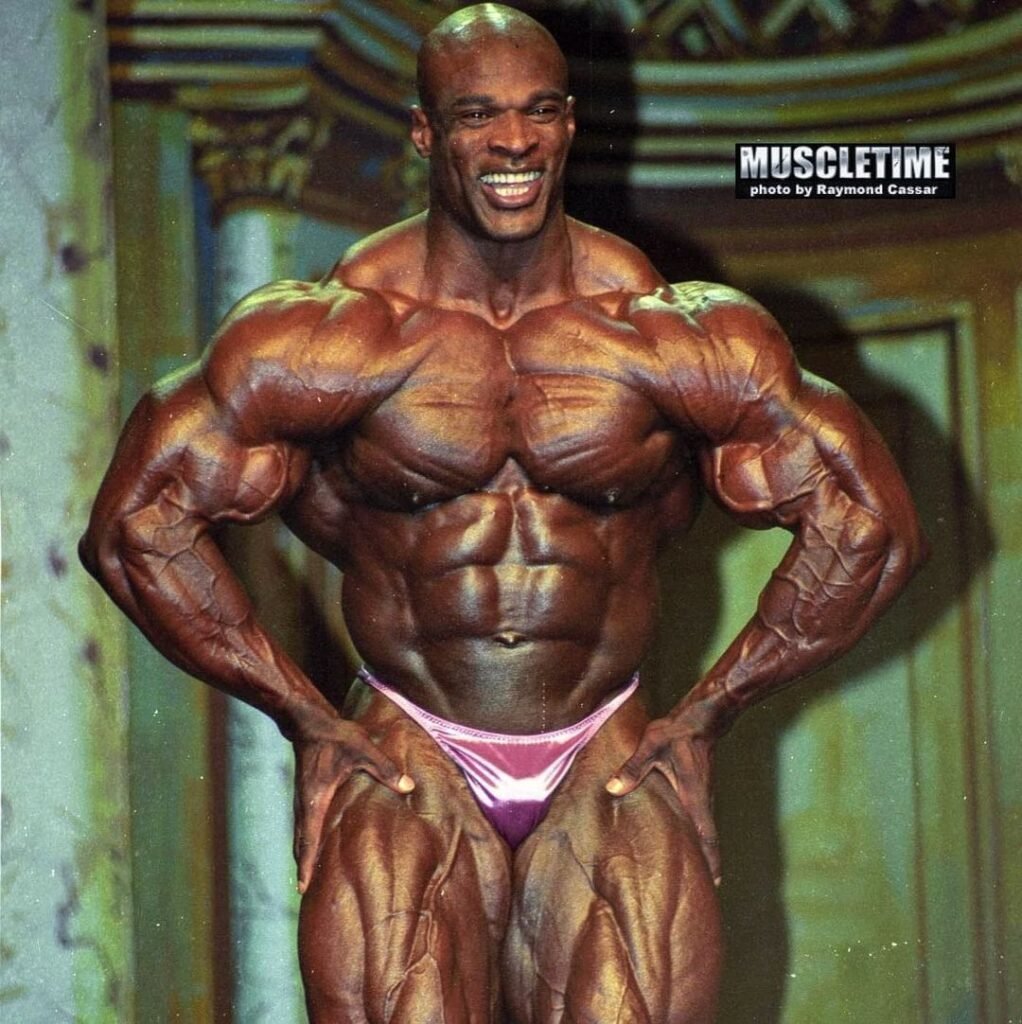
Ronnie Coleman’s bodybuilding resume remains untouched by any competitor:
- 8 consecutive Mr. Olympia titles (1998–2005) – a record
- 26 IFBB pro show wins – tied for the record
- Competed in 15 IFBB Grand Prix/Pro shows – record
- Won at least $1 million in prize money 15 times – record
- The oldest competitor to win is Mr. Olympia (age 41)
- Only Mr. Olympia title holder to win at ages over 40
- Longest span as Mr. Olympia title holder (8 years)
- Over $10 million in total prize money during career – record
Ronnie Coleman’s sustained dominance of men’s professional bodybuilding is unparalleled.
He elevated the mass, conditioning, strength, and aesthetics required to become Mr. Olympia to unfathomable new levels.
In many respects, his physique and achievements remain unsurpassed to this day.
Ronnie Coleman’s Competition Diet and Training
Here’s an inside look at Ronnie Coleman’s competition diet and training routine at the peak of his powers during his 8-year Mr. Olympia reign:
Diet:
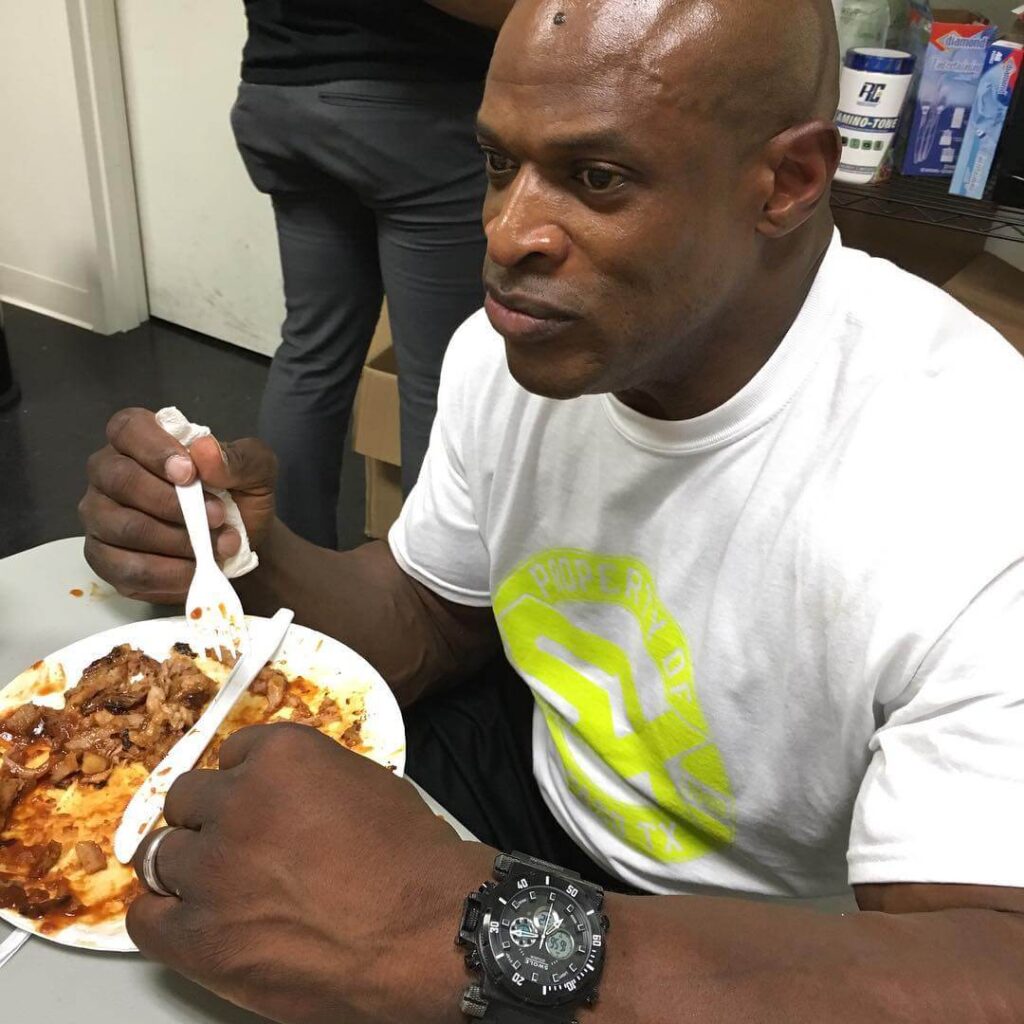
- Consumed 5,000 to 6,000 calories daily
- Emphasized lean proteins, complex carbs, healthy fats
- Ate 6-8 smaller meals spaced evenly for metabolism
- Fish, chicken, red meat, eggs, and whey protein were staples
- Brown rice, potatoes, oats, and vegetables for carbs
- Used amino acids, multivitamins, creatine, and thermogenic
- Worked with coach Chad Nicholls from 1996 on diet strategies
Training:
- Trained each body part once per week
- Performed 2 intense workouts daily, 6 days per week
- Workouts lasted 60-90 minutes each
- Used hefty weights and high volume
- Core training principles: forced reps, negatives, intensity
- Benched 500 lbs, squatted 800 lbs, military pressed 400 lb dumbbells
- Pushed through pain and injuries without missing workouts
- Used advanced techniques like 21s, drop sets, giant sets, and more
- Emphasized powerlifting and strength feats to build muscle mass
- Allowed 2-3 hours rest between daily workouts
To stimulate maximum muscle growth and strength, Ronnie Coleman prioritized heavy weights, high training volume, powerlifting principles, perfect form, and hardcore intensity. His unmatched size was forged from extreme training practices.
Ronnie Coleman’s Competition Training Routine
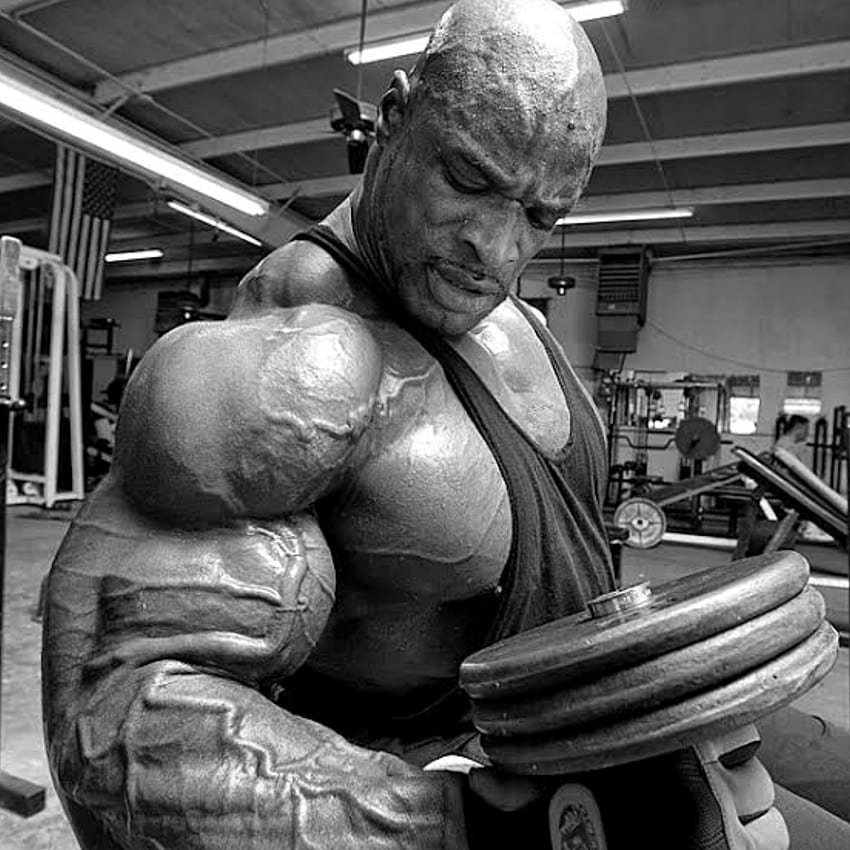
Here is a sample overview of Ronnie Coleman’s competition training split:
Day 1: Back, Rear Delts, Traps
| Deadlifts | 5 Sets x 6-8 Reps |
| Barbell Rows | 5 Sets x 6-8 Reps |
| Lat Pulldowns | 5 Sets x 8-10 Reps |
| Behind the Neck Pulldowns | 3 Sets x 8-10 Reps |
| Dumbbell Rows | 3 Sets x 8-10 Reps |
| Seated Cable Rows | 5 Sets x 8-10 Reps |
| Barbell Shrugs | 5 Sets x 8-10 Reps |
| Dumbbell Shrugs | 3 Sets x 8-10 Reps |
| Face Pulls | 5 Sets x 12-15 Reps |
Day 2: Chest, Front and Side Delts, Triceps
| Incline Barbell Press | 5 Sets x 5-8 Reps |
| Flat Barbell Bench Press | 3 Sets x 5-8 Reps |
| Incline Dumbbell Flyes | 5 Sets x 8-10 Reps |
| Machine Bench Press | 3 Sets x 8-10 Reps |
| Cable Crossovers | 5 Sets x 10-12 Reps |
| Military Press | 5 Sets x 6-10 Reps |
| Arnold Press | 3 Sets x 6-10 Reps |
| Lateral Raises | 5 Sets x 12-15 Reps |
| Front Raises | 3 Sets x 12-15 Reps |
| Overhead Extensions | 5 Sets x 8-10 Reps |
| Pushdowns | 3 Sets x 8-10 Reps |
| Kickbacks | 3 Sets x 12-15 Reps |
Day 3: Quads, Hamstrings, Calves
| Squats | 8 Sets x 8-10 Reps (High and Low Reps) |
| Leg Press | 5 Sets x 8-10 Reps |
| Hack Squats | 5 Sets x 8-10 Reps |
| Leg Extensions | 3 Sets x 10-12 Reps |
| Lying Leg Curls | 5 Sets x 8-10 Reps |
| Seated Leg Curls | 3 Sets x 10-12 Reps |
| Stiff Leg Deadlifts | 5 Sets x 8-10 Reps |
| Standing Calf Raise | 5 Sets x 10-12 Reps |
| Seated Calf Raise | 3 Sets x 15-20 Reps |
Day 4: Biceps, Forearms, Calves
| Barbell Curls | 6 Sets x 6-10 Reps |
| Incline Dumbbell Curls | 4 Sets x 8-10 Reps |
| Cable Curls | 3 Sets x 10-12 Reps |
| Preacher Curls | 3 Sets x 10-12 Reps |
| Hammer Curls | 3 Sets x 10-12 Reps |
| Wrist Curls | 5 Sets x 15-20 Reps |
| Reverse Wrist Curls | 5 Sets x 15-20 Reps |
| Standing Calf Raises | 5 Sets x 15-20 Reps |
| Seated Calf Raises | 3 Sets x 15-20 Reps |
Day 5: Full Shoulders and Traps
| Military Press | 5 Sets x 6-10 Reps |
| Dumbbell Press | 3 Sets x 6-10 Reps |
| Arnold Press | 3 Sets x 6-10 Reps |
| Lateral Raises | 5 Sets x 12-15 Reps |
| Front Raises | 5 Sets x 12-15 Reps |
| Cable Lateral Raises | 3 Sets x 12-15 Reps |
| Face Pulls | 5 Sets x 12-15 Reps |
| Shrugs | 5 Sets x 12-15 Reps |
| Dumbbell Shrugs | 3 Sets x 12-15 Reps |
Day 6: Arms and Calves Giant Set
| Close Grip Bench Press, Barbell Curls | Calf Raise Each x 3 Sets Back to Back |
| Overhead Extensions, Hammer Curls | Calf Raise Each x 3 Sets Back to Back |
| Tricep Press Downs, Preacher Curls | Calf Raise Each x 3 Sets Back to Back |
Ronnie Coleman followed an extremely high-volume routine with up to 16 sets per body part. He focused on powerlifting, strength-building exercises, and intensity techniques to achieve maximal muscle growth.
This challenging and heavy training approach allowed him to dominate bodybuilding’s biggest stage for 8 consecutive years.
Life Lessons from the King
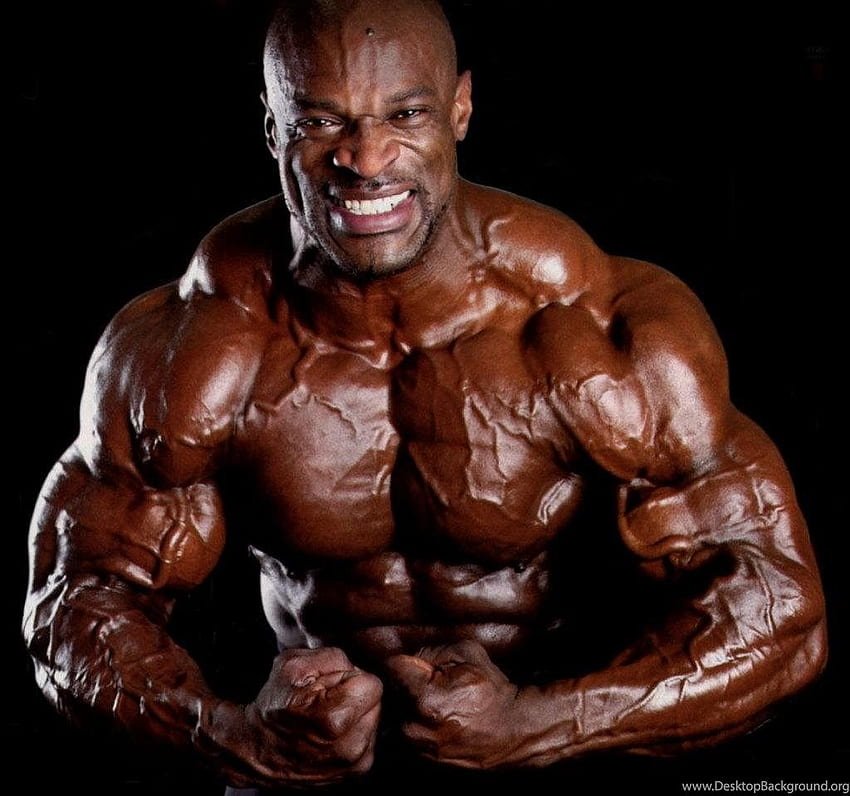
Throughout his unprecedented bodybuilding career, Ronnie Coleman demonstrated that ordinary people can achieve extraordinary things with focus and perseverance.
Here are some inspirational lessons that can be learned from the King’s path to greatness:
Believe in Your Abilities
Early in his career, Ronnie Coleman had the confidence and belief that he could one day be Mr. Olympia – before winning a major title. Self-confidence is crucial.
Be Persistent Against All Odds
Ronnie Coleman never let injuries, defeats, pain, or adversity sidetrack his Olympia goals. Giving up was not in his mentality. Persistence pays off.
Go All In On Your Dreams
Ronnie Coleman left his life as an accountant and policeman to pursue bodybuilding full-time. He gave the sport everything to make his dreams a reality.
Don’t Let Age Define You
Most bodybuilders retire in their 30s. Ronnie Coleman won his last Mr. Olympia at age 41. He redefined notions of youth and aging.
Heart Matters More Than Talent
Ronnie Coleman succeeded more in unrelenting work ethic than pure genetics. The size of your heart is more important than natural talents.
Challenge Yourself Daily
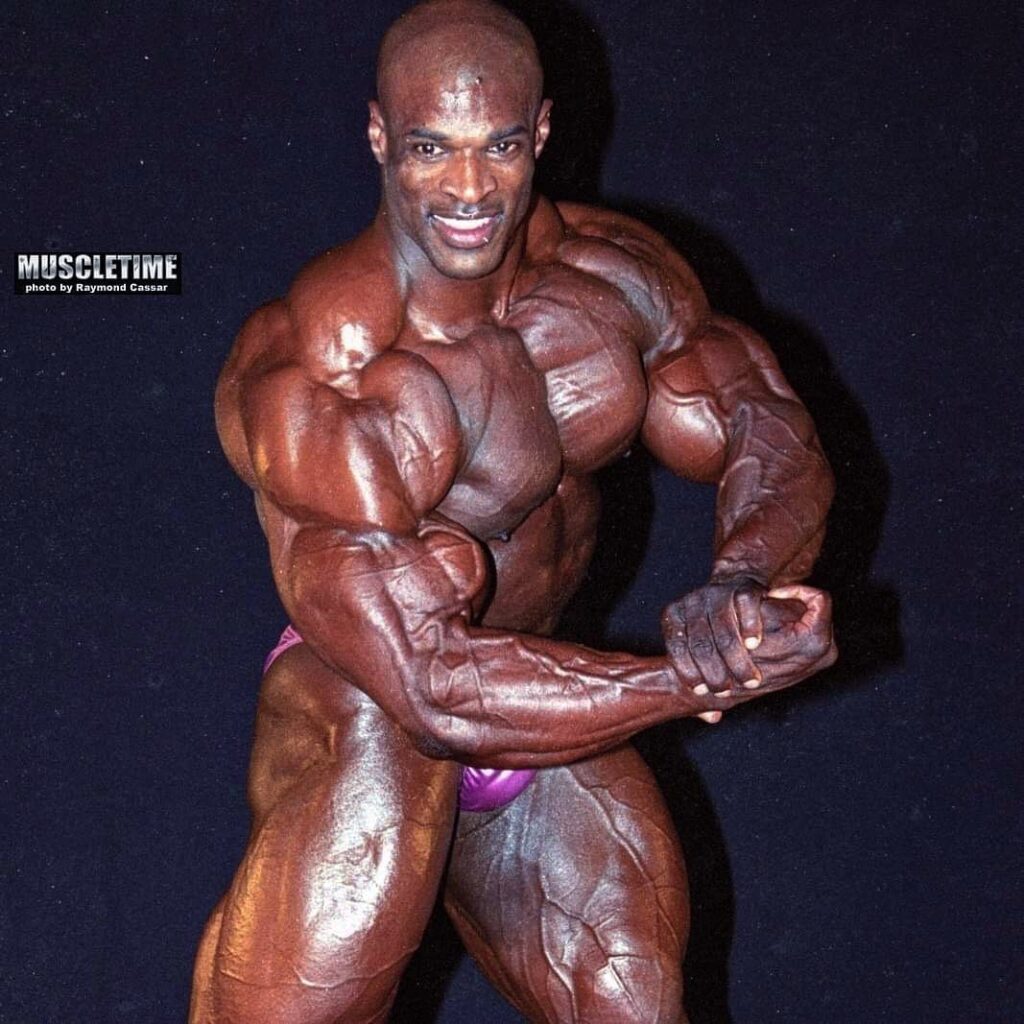
Ronnie Coleman constantly strove to lift heavier, train harder, and improve his physique. Pushing your limits daily is how you grow.
Focus On The Journey, Not The Destination
While winning Mr. Olympia was the goal, Ronnie Coleman found purpose in improving himself daily.
Be Magnanimous In Victory And Defeat
A consummate sportsman, Ronnie Coleman gracefully accepted defeat and remained humble during his long reign on top. Champion mentality.
Pay Your Dues
Before becoming Mr. Olympia, Ronnie Coleman paid his dues, competing for years without winning. Success comes to those who put in the work.
Never Give Up On Yourself
Even when doctors advised him to quit, Ronnie Coleman pushed through unbearable pain to keep competing. His willpower is unbreakable.
At age 58, Ronnie Coleman’s uncompromising mindset inspires new generations to achieve greatness. The lessons from his journey to the top transcend bodybuilding.
Ronnie Coleman’s Magnanimous Personality

In addition to his hulking physique and weights that defied gravity, Ronnie Coleman became equally renowned for his warm, charismatic personality that radiated positivity.
Ronnie Coleman carved out a unique image separate from previous champions.
He forged connections with fans through memorable catchphrases, inspirational speeches, and philosophies that revealed his humility and grace.
Some of Ronnie’s Coleman famous sayings included:
- “Yeah, buddy!”
- “Lightweight baby!”
- “Nothing but a peanut!”
- “Everybody wants to be a bodybuilder, but nobody wants to lift no heavy ass weights.”
- “We all gonna make it, brah.”
Ronnie Coleman built his brand around these uplifting mantras resonating with worldwide audiences. He understood the power of creating a likable, larger-than-life persona that inspired others.
Despite attaining the most incredible heights in bodybuilding, Ronnie Coleman never let ego or arrogance creep in. He remained approachable, gracious, and kind – a gentle giant and class act.
When newcomers sought advice, Ronnie Coleman mentored them at the gym between his workouts. He congratulated opponents and judged contests fairly during competitions in victory or defeat.
Ronnie Coleman transcended the sport by welcoming legions of fans into the bodybuilding world.
He was an inclusive ambassador who brought new demographics by making training appeal to the masses, not just hardcore lifters.
That unique combination of extreme muscle and humility allowed Ronnie Coleman to become a pop culture icon who ushered in a new Golden Era for bodybuilding.
Ronnie Coleman’s Competition Diet Explained

Fueling the incredible mass needed to complete over 300 pounds of shredded muscle took meticulous eating strategies.
Here is a breakdown of Ronnie Coleman’s competition diet to become Mr. Olympia:
- Consumed 5,000-6,000 clean calories daily
- Emphasized lean proteins and complex carbohydrates
- Ate 6-8 smaller meals per day for metabolism
- Fish, chicken, red meat, eggs, and whey protein were staples
- Brown rice, oats, potatoes, and vegetables for carbs
- Healthy fats from nuts, oils, salmon, and supplement oils
- Used multivitamins, creatine, amino, thermogenic
- Worked with trainer Chad Nicholls on a diet plan
- Carb cycled to aid fat loss and muscle fullness
- Higher carbs on training days, lower carbs on off days
- Peaked for competition by strategically loading carbs
Ronnie Coleman strategically cycled his carbohydrates throughout training. He paired high protein with higher carbs on workout days for energy and recovery.
On off days, he reduced carbs to encourage fat burning. As competitions approached, Ronnie Coleman used carb-loading techniques by adopting a high-carb, high-calorie diet for a set period before tapering back down.
This strategy helped maximize fullness and glycogen storage inside the muscles. He chose clean carbs like oats, rice, and potatoes over sugary junk food.
Lean proteins, healthy fats, amino, creatine, multi-provided muscular development, and optimal health. Good nutrition was the foundation that supported Ronnie Coleman’s extreme training.
Ronnie Coleman’s Competition Training and Leg Workouts
Ronnie Coleman’s workouts were as legendary as the massive 300-pound physique they built.
Here’s an inside look at his hardcore competition leg training:
- Prioritized heavy squats and leg presses
- Trained legs 2 times per week in the offseason
- Performed up to 10 sets of squats and 8 sets of leg presses
- Pyramided weights up to 800+ pound squats
- Leg pressed up to 2,500+ pounds for reps
- Squatted with 8 plates per side for reps before competitions
- Forced reps, negatives, and intensity techniques used
- Combined leg extensions, lying leg curls, hack squats
- Finished with high rep leg presses as a burnout
- Cycled between power, strength, and hypertrophy rep ranges
- Used advanced techniques like Giant sets, Triple drops
- Squatted deep with excellent form and a full range
Ronnie Coleman famously stated that everybody wants to be a bodybuilder, but nobody wants to lift heavy weights. His incredible leg development personified this mentality.
By mastering hardcore lifts like the squat using monstrous weights, Ronnie Coleman built arguably the most extensive and shredded set of wheels in bodybuilding history.
Legs separate the champions from the contenders. Ronnie Coleman combined a powerlifting mentality with bodybuilding-style training.
He went heavier than traditional bodybuilders yet used a variety of intensity techniques they employed. Above all, he prioritized immaculate exercise mechanics on squats.
Ronnie Coleman kept tension on his quads by squatting deep while keeping his knees and feet aligned. This allowed him to reap benefits without injury.
His rigorous leg training formed the foundation for achieving the best physiques ever. Ronnie Coleman built his legendary legs through a relentless quest to lift heavier weights and push the boundaries.
Ronnie Coleman’s Post Bodybuilding Life
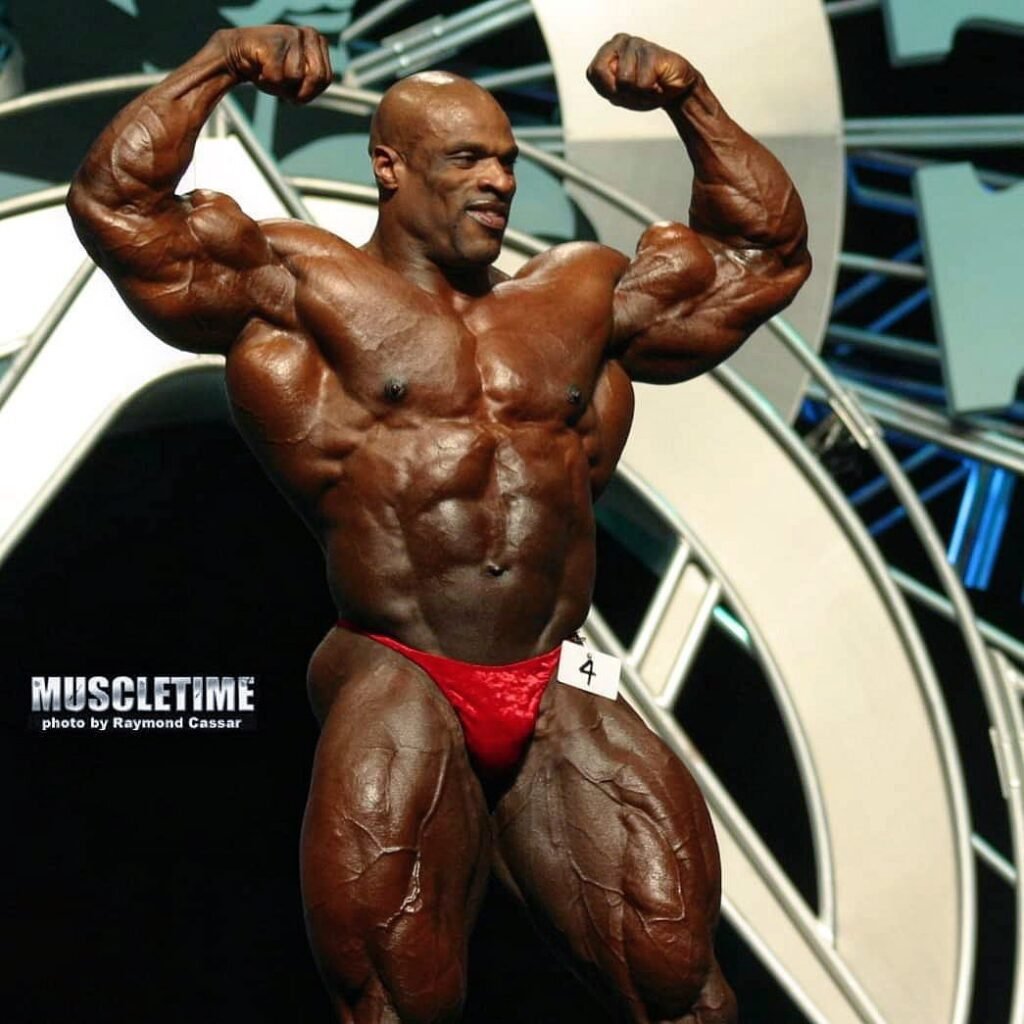
Since retiring after his 8th consecutive Mr. Olympia title, Ronnie Coleman has remained actively involved in the sport, which made him an icon.
He continues to guest pose at competitions, judge contests, and publicly appear. Ronnie Coleman also launched his successful Ronnie Coleman Signature Series line of supplements.
He coaches and provides online training programs to thousands seeking his expertise.
Outside fitness, Ronnie Coleman has led a quiet, humble life in Texas, focused on raising his two daughters and hobbies like fishing and spending time with family.
He authored an autobiography titled “Yeah Buddy!” that detailed his life’s journey. Despite the record-shattering accolades and fame, Ronnie Coleman has stayed true to his roots.
He embodies the relentless work ethic that made him the greatest ever. Ronnie Coleman will forever remain “The King” of bodybuilding.
Ronnie Coleman – Bodybuilding’s Greatest of All Time
When historians look back on the legends who shaped professional bodybuilding over time, one name sits high above the rest – Ronnie Coleman.
Ronnie Coleman’s unmatched run of 8 straight Mr. Olympia victories during the late 90s and early 2000s established an untouched new standard.
He built arguably the most incredible physique ever seen through a mythic combination of science-defying muscle mass, granite conditioning, and otherworldly strength.
Beyond the imposing physical stats, Ronnie Coleman’s larger-than-life persona and unwavering work ethic captured the hearts of millions worldwide. He remains the quintessential ambassador for the sport.
Despite the devastating effects that competitive bodybuilding had on his health, Ronnie Coleman has no regrets about chasing greatness at all costs. That mindset established his legacy as a warrior.
At his peak, no other bodybuilder compared to the mythical proportions and strengths that Ronnie Coleman achieved. Therefore, he will forever stand alone as “The King” and the greatest bodybuilder ever.
The sport is still chasing the standard he set decades ago. Ronnie Coleman earned his place in history through relentless sacrifice to always better his best. That is the essence of a true champion.